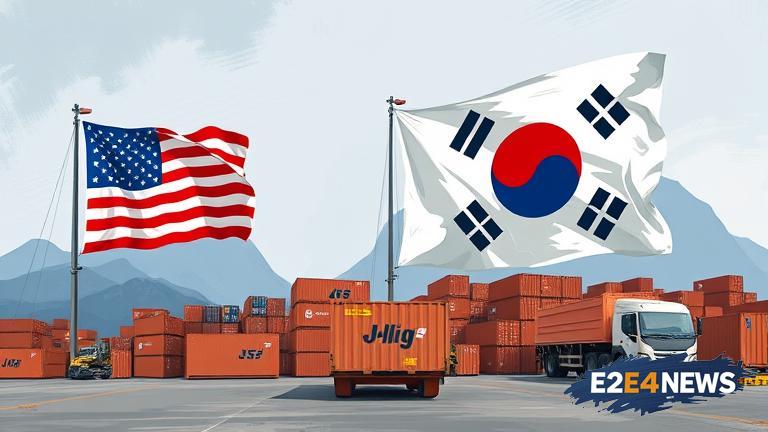The United States has imposed a 15% tariff on certain South Korean imports, according to a statement released by the Trump administration. This move is seen as a significant escalation of the ongoing trade tensions between the two countries. The tariff will affect a range of South Korean products, including electronics, automobiles, and steel. The decision has been met with widespread criticism from South Korean officials and business leaders, who argue that it will harm the country’s economy and damage bilateral relations. The US has been seeking to renegotiate its trade agreement with South Korea, citing concerns over the country’s trade surplus and perceived unfair trade practices. South Korea has responded by filing a complaint with the World Trade Organization, arguing that the US tariffs are unfair and violate international trade rules. The trade tensions between the US and South Korea have been simmering for months, with the US seeking to reduce its trade deficit with the country. The US has also been pressuring South Korea to increase its imports of American goods, including agricultural products and energy exports. The South Korean government has responded by announcing plans to increase its imports of US goods, but the US has deemed these efforts insufficient. The imposition of the 15% tariff is seen as a significant escalation of the trade dispute, and has sparked concerns of a full-blown trade war between the two nations. The trade war could have far-reaching consequences for the global economy, including higher prices for consumers and reduced economic growth. The US and South Korea have a long-standing trade relationship, with the US being one of South Korea’s largest trading partners. However, the trade deficit between the two countries has been a source of tension, with the US seeking to reduce its trade deficit with South Korea. The trade tensions have also been fueled by concerns over South Korea’s trade practices, including its use of non-tariff barriers and subsidies for domestic industries. The US has been seeking to address these concerns through negotiations, but the talks have been slow to produce results. The imposition of the 15% tariff is seen as a sign of frustration from the US, which is seeking to pressure South Korea into making concessions. The move has been met with widespread criticism from business leaders and economists, who argue that it will harm the US economy and damage bilateral relations. The trade war could also have significant consequences for other countries, including China, which is a major trading partner of both the US and South Korea. The trade tensions have also been fueled by concerns over national security, with the US seeking to reduce its dependence on foreign suppliers for critical goods. The imposition of the 15% tariff is seen as a significant escalation of the trade dispute, and has sparked concerns of a full-blown trade war between the two nations. The trade war could have far-reaching consequences for the global economy, including higher prices for consumers and reduced economic growth. The US and South Korea must work together to resolve the trade dispute and avoid a full-blown trade war. The two countries have a long-standing trade relationship, and it is in their mutual interest to resolve the dispute through negotiations. The imposition of the 15% tariff is a significant escalation of the trade dispute, and it remains to be seen how the situation will unfold in the coming weeks and months.
